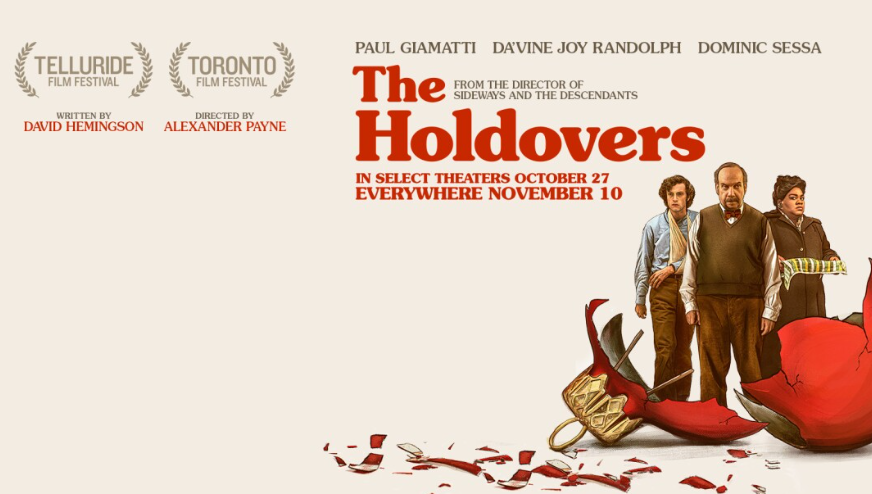Making Waves - The hOLDOVERS (2023)
Film Soundtrack Reviews by: Aidan Monks
Campus movies have a good relationship with music. Whether we’re talking Donnie Darko or Lady Bird, the escapist escapades of Rushmore, Alan Parker’s 1980 hallmark Fame, or the symphonic grandeur offered by Maurice Jarre (of Lawrence of Arabia) for the cornerstone of all ‘Dad Movies’, Dead Poets Society, you will generally find most films set in/around high schools are graced with a memorable - if not iconic - track list. While Donnie Darko could not be more different to Dead Poets Society, and neither could its Tears for Fears soundtrack, there is something evocative in the soundtracks to all of these campus movies that really make them tick. Could you imagine Max Fisher (of Rushmore) triumphantly cycling to anything but John Lennon’s euphoric Oh Yoko!?
With 2023’s The Holdovers, Alexander Payne has contributed to the canon of campus cinema with no less than one of the best films of the year. Set in 1970/1971, the film highlights three characters: Paul, an authoritarian but lonely Ancient Civilisations teacher at an independent boarding school in New England, Mary, an African American cafeteria administrator grieving the loss of her son in Vietnam, and Angus, one of the students ‘holding over’ at the school over the Christmas break. This tragicomedy has received as much awards buzz as it has critical acclaim, with Oscar nods in five different categories, making me yet another cinema-goer who gave the film a rapturous thumbs-up.
Like any period film, The Holdovers is tasked with constructing a convincing historical diegesis. Payne attempts to recreate a historical world through various audio-visual means, but the soundtrack plays a pivotal role. Quintessential late ‘60s and early ‘70s groups like The Allman Brothers Band, The Temptations, and Shocking Blue are included, retroactively achieving what Dennis Hopper and Peter Fonda did with Easy Rider. The soundtrack perfectly presents a contemporary time and place, seamlessly syncing visuals with a relevant soundtrack. While Easy Rider - being one of, if not the first film to employ popular music - used The Band and The Byrds to enact a similar aesthetic revolt as its forward-facing hippies do with their shaggy beards and thunderous Harley-Davidsons against the American establishment’s assault on Southeast Asia, The Holdovers uses the same brand of soft rock to instead look back.
The difference between The Holdovers and any generic period film is that the choice of music - whether classic rock or Mark Orton’s original score - takes on a greater function within the film than world-building. The film is highly nostalgic, with a pitch-perfect selection of time-specific songs that connote a lost era, among other themes and relationships. One of the more memorable scenes takes place when Paul takes an otherwise depressed and entrapped Angus ice skating; the moment Angus feels freedom for the first time in the film, the soundtrack encapsulates the childlike feeling of happiness associated with his Christmases past, when his father was still present and his family whole. Cat Stevens’ whimsical The Wind plays, directly referencing its iconic use in 1998’s Rushmore. Here, we have a callback to the past (the 1990s or the 1970s?) with a song noted for its hopeful lyrics aptly chosen for Angus’ state of mind as he skates. The music encapsulates the tone of the film as being a story which displaces modern audiences in an increasingly distant history and points forward, promising the future. I wonder if the nostalgic style of filmmaking exhibited in this movie is as blind as any other period dramedy, which uses all of the tools of such as genre, from lavish wardrobes, to time-appropriate songs, to neutrally reproduce history, or if there is something more cynical being said about where we were in the ‘70s and where we are now. Have we really seized the future as Paul wants for Angus and the younger generations he ultimately represents?
If we’re talking tone, it would be criminal to ignore Orton’s subtle but indispensable score as so many critics have. While the most noteworthy tracks in the film are rock, R&B, soul, and singer/songwriter cuts (with the occasional Andy Williams cover), you can hear Orton’s instrumentals running through scene transitions, movement, and behind dialogue. This original score supports mood, setting, and character until his touching melodies carry the film to its emotional climax as our characters part ways and school life carries on as normal. Like any good original score, Orton’s music is practically undetectable in a first viewing of The Holdovers because it achieves what a film score should: corroboration of image. The Holdovers is not a flashy movie by any means, so we should not expect John Williams-level exuberance. Orton instead presents something appropriately minimal for the closing frames which - like any sentimentalist hang-out narrative - merit mustering keys, strings, and percussion to send our lovable characters into the unknown, content that their journeys converged for the short time that they did. A score should crescendo with a film’s narrative, providing a sense of closure where the screenplay yields to ambiguity. Mark Orton achieves this remarkably.
It’s one thing to read about a film and its soundtrack, and another to see it for yourself - The Holdovers is still playing in our endangered NPH Cinema, and I thoroughly recommend seeing it on as big a screen as possible while the town has some to offer.

